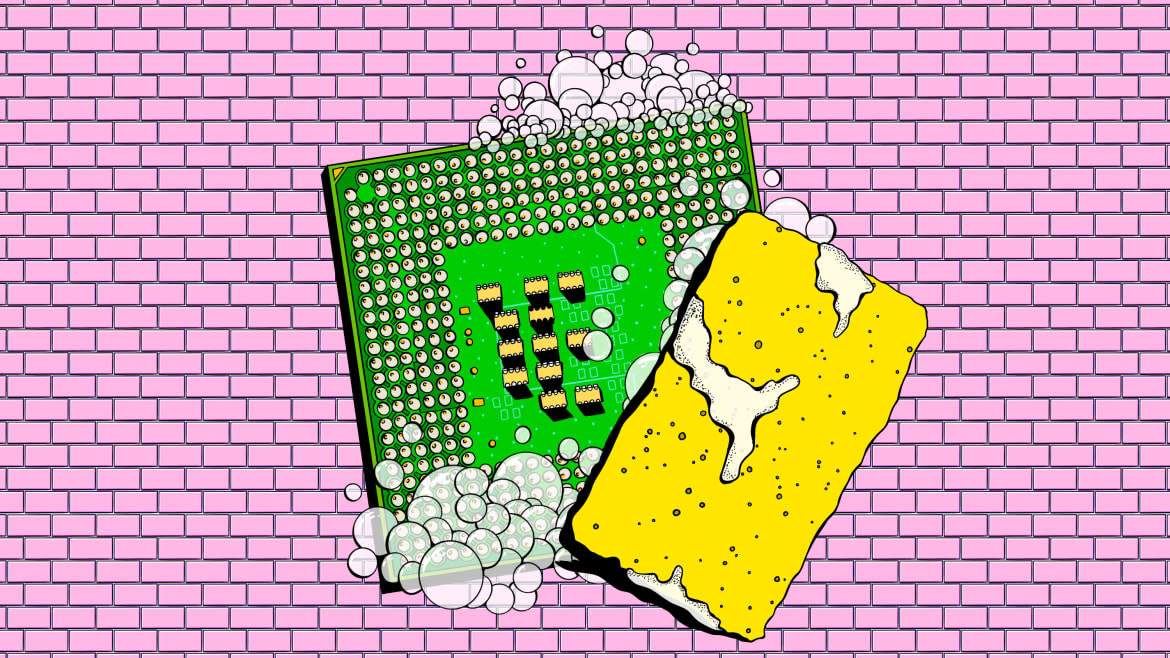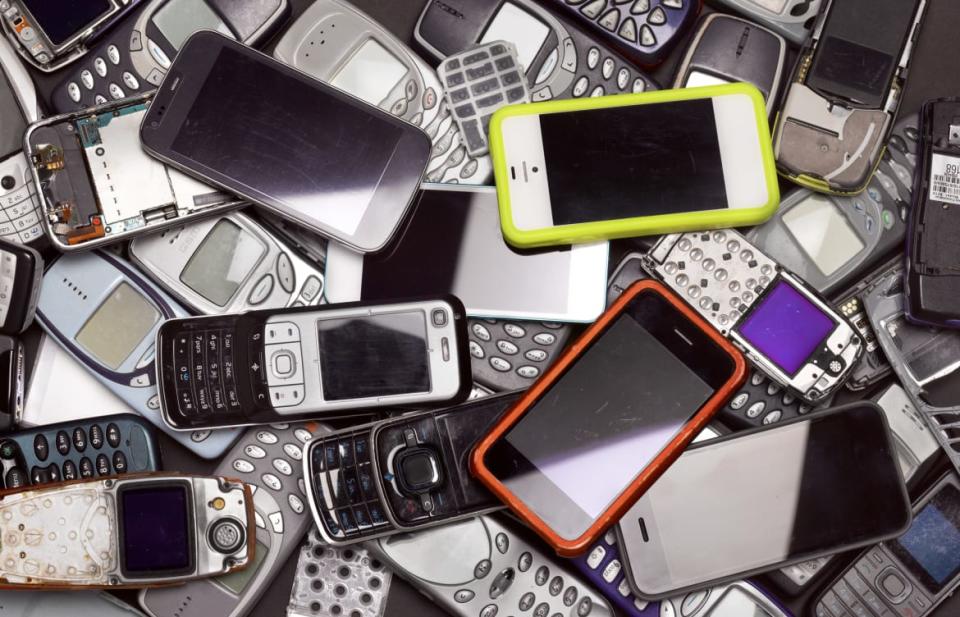Why You Desperately Need a Digital Spring Cleaning

Like many ill-fated journalists of 2024, I lost my job this year. As media companies guillotined their staff to cut their Q1 budgets, I was forced to adjust my spending and recalibrate my life. I factored in my essential costs (rent, utilities, food, gas) and bid a temporary farewell to frivolous spending (Sephora hauls, chronic eating out, $8 lattes).
One cost I only considered once I was faced with my existential options was my tech and digital footprints. I was on the last legs of an old iPhone—cracked screen et al—with a battery that drained every three hours. My Gmail storage was reaching its upper limits and my personal MacBook could not compete with the speed and processing power of my work laptop.
I was at my local Verizon store, facing a deadpan customer service rep asking if I wanted to shell out hundreds of dollars for a new phone with more storage. He said it was a great promotional offer and that I’d need it. He was right—I did need a new phone and more storage, now, more than ever. But I was completely paralyzed by the irony of needing to spend more, at a fiscally tough time, to try to get my life in order. And for something that was completely intangible.
Still, I knew being connected online and having my digital safekeeps was my only path to landing a job again. I resentfully swiped my credit card. I then went home and paid to upgrade my Gmail storage. Even though I spent hours deleting old emails, I was accruing at a higher rate than I could reasonably spend deleting.
With consumers spending more on tech every year (to a projected $512 billion this year), and dependency on tech at an all-time high (with potentially dangerous consequences), tools that help organize our digital footprints and make our online presences more fluid are becoming a worthwhile expense. But how highly should I prioritize it? How much should I spend to store my data and activities, versus frequently deleting and cleaning them up? Since we create so much digital pollution every day—and our storage units for them are vaporous clouds—are we also more susceptible to unnecessary hoarding?
According to two experts I spoke to in the data storage space, we are each generating roughly 8MB of data traffic every day when we’re online. Ten years ago, it was 2MB. They estimated that the average American owns about 500 GB of storage for everything (which includes social media usage—and, yes, how much time you’re spending and engaging on TikTok) and that will continue to increase.
The Hidden Cost of Invisible Storage
Will Button, an engineer at Polygon Labs and the creator of the DevOps for Developers YouTube channel, told The Daily Beast that while we should invest in our tech use, those costs will stay relatively affordable for the average consumer because of an economic concept called Moore’s Law.
“Moore’s Law states that computing speed and power doubles every two years. As a result, cost goes down,” he said. “In the business world, we count on this price reduction over time. In the consumer market, you typically don’t see prices go down, but you do see your buying power go up.”
What this means (for me, effectively) is that I don’t need to freak out about budgeting too much for these new life costs. I should expect to see more bundled deals, like getting “free” cloud storage with every new phone purchase, in the future to leverage costs.

If you take a lot of photos, Button thinks spending a few dollars to increase your storage size is worthwhile.
A reasonable spend every month for cyberstorage is about $10, “which will get you 2TB from the most common providers like Google, Dropbox, and Apple,” according to Button. He expects that budget “to remain relatively stable” over our lifetimes, “though making any technology forecasts 20 or 30 years in the future is tough.”
Button added that buying a new phone with more storage was a smart choice on my part, even if it was a hefty upfront cost. “Maybe your phone is the best bang for your buck because you solve the phone problems, get additional storage, alleviating the storage issues, [and] if your laptop completely dies, it’s possible to use your phone for the same tasks.”
However, the more companies offer cost saving promotions, the more they might incentivize us to hoard and buy more space, as opposed to reducing our tracks. Steven Athwal, the managing director of the UK-based tech resale and refurbishing company The Big Phone Store, told The Daily Beast that phone companies will likely push us to buy more on-site storage in the name of convenience.
“In the past, most people haven’t paid for additional storage. However, with plans starting at 99 cents, tech companies seem keen to change that,” Athwal said. “iPhones cost $200 more for every 256GB of internal storage, and that $200 could pay for 200GB of iCloud storage for six years, or the expected lifetime of the phone.”
Digital Spring Cleaning
Athwal said the cheapest storage option by far is to buy physical hard drives. If spending $10 a month for a digital storage unit, or hundreds (if not thousands) of dollars on a new product (akin to buying a new home), is not within budget, both experts advise routinely deleting cookies, files, and apps—like spring cleaning—every season.
“I would recommend cleaning out your storage and dividing it into two categories: professional and personal,” Button said, which includes “projects, deliverables, and previous work showcased to demonstrate your experience to future employers or prospective clients.” He also advises uploading these large files to one central place online, like on a website, so you would only need to share a link.
If you’re someone who takes a lot of photos for example, which falls under the “personal” category, Button thinks spending a few dollars to increase your storage size is probably worthwhile than “spend[ing] the next six hours cleaning up drunken selfies from that trip to Cabo 10 years ago.” Athwal said he tends to hold onto old emails with important messages or files, no matter what. Everything else, “I regularly go through and delete.”

Tools that organize our digital footprints and make our online presences more fluid are a worthwhile expense.
On an iPhone, 128 GB should be enough to hold onto tens of thousands of images and all your favorite apps. However, mobile games take up a tremendous amount of space (“the largest ones are bigger than 20GB,” he noted), so avid gamers should be more mindful. Producers and influencers may also be forced to buy a lot more storage because video files can range from 150MB to 6GB a minute.
“Avid videographers can burn through a full terabyte of data in no time at all,” he said.
With both inflation and the cost of home-buying ballooning every year, it becomes especially funny and frustrating to have to factor in online real estate costs. The latter doesn’t come close to comparing in its actual cost burdens, but this new reality is both interesting and devastating: Most of us will never be able to buy a home in our lifetimes, but we all will own lots of cloud space, with ethereal office boxes containing all of our online lives stacked neatly in the sky.
Invisible land may not be a status symbol, but it is a heck of a lot easier to maintain.
Get the Daily Beast's biggest scoops and scandals delivered right to your inbox. Sign up now.
Stay informed and gain unlimited access to the Daily Beast's unmatched reporting. Subscribe now.

